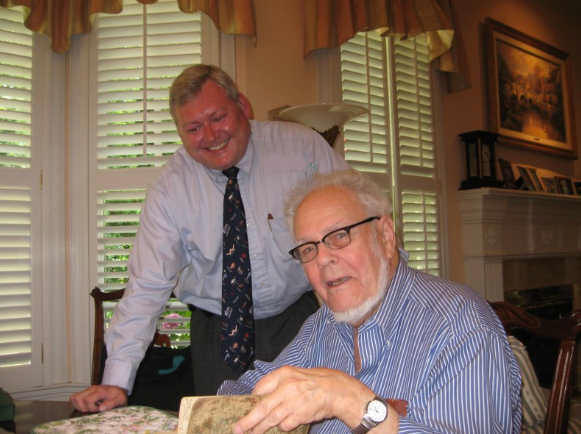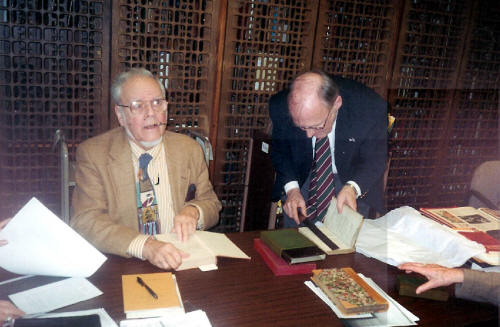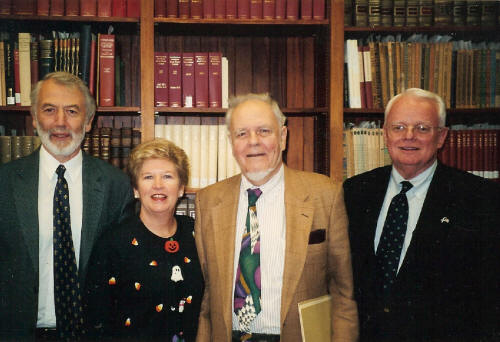|
Edited by Frank R. Shaw, FSA Scot, Dawsonville, GA, USA
Email:
jurascot@earthlink.net

Victor Gregg, past president of the Atlanta
Burns Club, showing Dr. Roy his Kilmarnock
I met G. Ross Roy several
years ago and have never gotten over our first meeting. He has had a
tremendous effect on my life and, in particular, my search for the truth
about Robert Burns, especially since there is so much nonsense or
misinformation about Burns on the internet and in books and periodicals. Dr.
Roy’s advice and suggestions on rare books have aided me in my quest to
build a private library on Burns, now with over a thousand books on Burns
alone and housed in a separate room in my office simply referred to as the
Burns Room.
The world, not just the Burns
world, is a better place because of people like G. Ross Roy and his lovely
wife Lucie. If you look up the word gentleman in the dictionary, you
will find his picture. Here is a man who has practiced through the years
what he has taught at great universities in America and Canada. Simply put,
Professor Roy is, in my opinion, the top Burns scholar in the world today.
He dearly recalls his
grandfather, W. Ormiston Roy, and the trip the two of them took to Scotland
when Dr. Roy was just an eight-year-old lad. Professor Roy named a
fellowship after his grandfather at the University of South Carolina where
the G. Ross Roy Collection of Robert Burns and Burnsiana boasts
approximately 6,000 items. In addition, the University’s Thomas Cooper
Library has one of the foremost collections of Scottish literature anywhere
outside Scotland. William Penn Warren wrote a classic some time back (or a
“long time since,” if you please) and titled it A Place to Come To.
The University of South Carolina is the “place to come to” for studying or
researching icons of Scottish literature like Burns, Scott, Hogg, and
MacDiarmid, to name a few. A heads up to those who profess to be Burns
scholars - The G. Ross Roy Collection of Robert Burns, An Illustrated
Catalogue, compiled by Elizabeth A. Sudduth, with the assistance of
Clayton Tarr, is hot off the press. Watch for a book review of this major
Burns catalogue.

Dr. Ross Roy and Dr. Patrick Scott measuring a
Kilmarnock
During a recent telephone
conversation, I asked Dr. Roy when he first realized or knew that he would
spend his life teaching Robert Burns and Scottish Literature. He told me a
brief story during his graduate school days of him and his best friend, Aris
Domnas, (friends since the sixth grade) cooking a meal in the home of Dr.
Roy’s grandfather on a New Year’s Eve while Auld Lang Syne was
playing on the radio. At the conclusion of the song, the commentator
returned to the air and commented that maybe Burns didn’t write Auld Lang
Syne. He heard his grandfather retort, “Oh, hell!” and Dr. Roy’s reply
to my query was that “I knew then I’d have to get involved teaching Burns.”
I asked if he minded my quoting him and his grandfather, and his reply was
Ross Roy vintage: “I don’t mind, Frank, and my grandfather is not going to
say anything about it”. (Dr. Roy is an octogenarian and his grandfather
passed away years ago!)
I now come to a close of the
series on What Burns Means to Me that has been posted on this website
over the last six weeks. I have learned something from each of these
wonderful Scots and, in particular, I am fascinated with Eddi Reader’s
concept of the “Burns Police” regarding her interpretation of the songs of
Burns. It is fitting that Dr. Roy concludes this wee series of some of the
most distinguished teachers, writers, speakers and singers in Scotland
today.
What Burns Means to Me
Professor G. Ross Roy, Curator
Department of English
University of South Carolina
Columbia, South Carolina.

Dr. Kenneth Simpson of the University of
Glasgow, Susan Shaw, Dr. Ross Roy, and Frank Shaw
Five prominent Scots persons
have written eloquently on the topic What Burns Means to Me and I
could add little to what Gerard Carruthers, Billy Kay, David Purdie, Eddi
Reader and Kenneth Simpson have already said. Burns has a personal meaning
for every reader; as my grandfather W. Ormiston Roy told me there was no
situation in life for which he could not find a suitable quotation from
the Bard.
What I can add from the
vantage of well over a half century of Burns study, and as sort of a closing
paragraph to the above mentioned writers about What Burns Means to Me
is this. In my lifetime Robert Burns has brought me into contact with an
extraordinary array of people whom I could not have met other than through
our mutual admiration for and love of the man and the poet Robert Burns. I
have led a full life with much to be thankful for and some things to regret,
but that life would have been immeasurably poorer without the contacts I
have enjoyed with other Burnsians. All of this I owe to the Immortal Memory
of Robert Burns.
(FRS: 3.24.09) |

